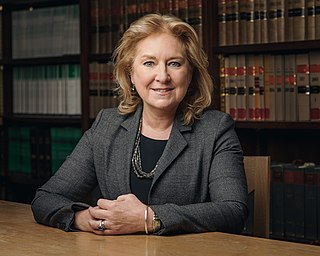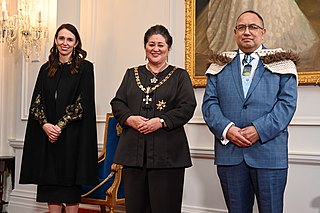Related Research Articles
Forms of address used in the United Kingdom are given below.

The Lady Chief Justice of England and Wales is the head of the Judiciary of England and Wales and the president of the Courts of England and Wales.

Mary Howarth Arden, Baroness Mance,, PC, known professionally as Lady Arden of Heswall, is a former Justice of the Supreme Court of the United Kingdom. Before that, she was a judge of the Court of Appeal of England and Wales.

The Order of precedence in New Zealand is a guide to the relative seniority of constitutional office holders and certain others, to be followed, as appropriate at State and official functions. The previous order of precedence was revoked and Queen Elizabeth II approved the following Order of Precedence in New Zealand effective 20 September 2018:
- The Monarch of New Zealand.
- The Governor-General or, while acting in the place of the Governor-General, the officer administering the Government
- The Prime Minister
- The Speaker of the House of Representatives
- The Chief Justice
- The Dean of the Diplomatic Corps
- The Deputy Prime Minister
- Ministers of the Crown
- Former Governors-General
- Ambassadors and High Commissioners in New Zealand and Chargés d’Affaires accredited to New Zealand.
- The Leader of the Opposition in the House of Representatives
- Leaders, including co-leaders and joint leaders, of political parties represented in the House of Representatives, other than Ministers of the Crown.
- Members of the House of Representatives. There is no established order of precedence over members of parliament in general, although each party has its internal ranking.
- Judges of the Supreme Court of New Zealand, the Court of Appeal and the High Court of New Zealand.
- Former Prime Ministers, former Speakers of the House of Representatives, former Chief Justices, and members of the Privy Council.
- Mayors of territorial authorities and chairpersons of regional councils, while in their own cities, districts and regions. In 1989, boroughs and counties were amalgamated into district councils. District mayors, and the Chatham Islands mayor could expect to be accorded this same precedence.
- The Public Service Commissioner, Chief of Defence Force, Commissioner of Police, and Officers of Parliament .
- The Solicitor-General, Clerk of the House of Representatives, and Clerk of the Executive Council when attending a function involving the exercise of the position’s specific responsibilities.
- Chief executives of public service and non-public service departments.
- The Vice Chief of Defence Force, and Chiefs of Navy, Army and Air Force, and other statutory office holders.
- Consuls-General and Consuls of countries without diplomatic representation in New Zealand.
- Members of New Zealand and British orders, and holders of decorations and medals in accordance with the Order of Wear in New Zealand.

The Court of Appeal of New Zealand is the principal intermediate appellate court of New Zealand. It is also the final appellate court for a number of matters. In practice, most appeals are resolved at this intermediate appellate level, rather than in the Supreme Court. The Court of Appeal has existed as a separate court since 1862 but, until 1957, it was composed of judges of the High Court sitting periodically in panels. In 1957 the Court of Appeal was reconstituted as a permanent court separate from the High Court. It is located in Wellington.
The chief justice of Ireland is the president of the Supreme Court of Ireland. The chief justice is the highest judicial office and most senior judge in Ireland. The role includes constitutional and administrative duties, in addition to taking part in ordinary judicial proceedings.
The Judicial Appointments Commission (JAC) is an independent commission that selects candidates for judicial office in courts and tribunals in England and Wales and for some tribunals whose jurisdiction extends to Scotland or Northern Ireland.

The chief justice of New Zealand is the head of the New Zealand judiciary, and presides over the Supreme Court of New Zealand. The chief justice of New Zealand is also the chief justice of Tokelau. Before the establishment of the Supreme Court in 2004, the chief justice was the presiding judge in the High Court of New Zealand, and was also ex officio a member of the Court of Appeal of New Zealand. The office is established by the Senior Courts Act 2016, which describes the chief justice as "senior to all other judges".

There are various levels of judiciary in England and Wales—different types of courts have different styles of judges. They also form a strict hierarchy of importance, in line with the order of the courts in which they sit, so that judges of the Court of Appeal of England and Wales are given more weight than district judges sitting in county courts and magistrates' courts. On 1 April 2020 there were 3,174 judges in post in England and Wales. Some judges with United Kingdom-wide jurisdiction also sit in England and Wales, particularly Justices of the United Kingdom Supreme Court and members of the tribunals judiciary.

The Judges' Council is a body in England and Wales that, representing the judiciary, advises the Lord Chief Justice on judicial matters. It has its historical roots in the original Council of the Judges of the Supreme Court, created by the Judicature Act 1873 to oversee the new Supreme Court of Judicature. This body initially met regularly, reforming the procedure used by the circuit courts, and the new High Court of Justice but met less regularly as time went on, meeting only twice between 1900 and 1907, with a gap of ten years between meetings in 1940 and 1950 respectively. After relative inactivity, it was eventually wound up through the Supreme Court Act 1981, which contained no provisions for its continued existence, something Denis Dobson attributes to newer bodies which performed the duties the Council had originally been created to do.
The President of the Court of Appeal of the Bahamas heads the Court of Appeal of the Bahamas.
The Vice-President of the Civil Division is a Court of Appeal Judge who assists the Master of the Rolls in leading the Civil Division of the Court of Appeal of England and Wales. The power to appoint a vice-president was created by the Senior Courts Act 1981, but was not exercised until Lord Phillips of Worth Matravers was appointed Master of the Rolls in 2000. Because Lord Phillips was in the process of completing the inquiry into the bovine spongiform encephalopathy (BSE) outbreak, he appointed Sir Martin Nourse the first vice-president so he could serve as Acting Master of the Rolls.
The Senior Presiding Judge for England and Wales is a member of the Court of Appeal appointed by the Lord Chief Justice to supervise the Presiding Judges for the various judicial circuits of England and Wales. The Senior Presiding Judge is responsible for deployment and personnel issues for all circuits and acts as a "general point of liaison" for the courts, judiciary and Government.
Sir James Michael Dingemans, styled The Rt Hon Lord Justice Dingemans, is a judge of the Court of Appeal, having previously served as a High Court judge.
Dame Siobhan Roisin Keegan is a Northern Irish judge who has been Lord Chief Justice of Northern Ireland since September 2021. She was formerly a judge of the High Court of Northern Ireland from October 2015 until her appointment as Lord Chief Justice, prior to which, she practised as a barrister specialising in family law.
Sir John Gillen, PC, previously known as The Rt Hon Lord Justice Gillen, and before that as Mr Justice Gillen, is a Privy Councillor and was one of the Lords Justices of Appeal of Northern Ireland, from September 2014-November 2017.
Sir Bernard McCloskey KC, styled The Rt Hon Lord Justice McCloskey, is a Northern Ireland judge, who has been a Lord Justice of Appeal since September 2019. He was called to the bar in 1979, made a Queen's Counsel (QC) in 1999, and appointed a High Court Judge in 2008. He served as chair of the Northern Ireland Law Commission from 2009 to 2012.

The King's Bench Division of the High Court of Justice deals with a wide range of common law cases and has supervisory responsibility over certain lower courts.
References
- 1 2 "Justice (Northern Ireland) Act 2002".
- ↑ "Justice (Northern Ireland) Act 2002".
- ↑ Judiciary and courts in Northern Ireland, legislation.gov.uk; accessed 28 December 2015.
- ↑ "Judiciary of Northern Ireland".
- 1 2 3 Justice (Northern Ireland) Act, 2002, section 12